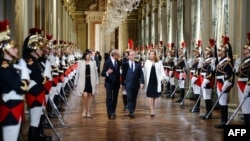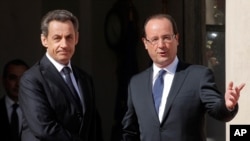PARIS - Francois Hollande became France's first Socialist president in nearly two decades Tuesday, just over a week after he beat conservative incumbent Nicolas Sarkozy. Hollande's first challenge comes hours after his swearing-in ceremony, when he heads to Berlin for talks with German Chancellor Angela Merkel.
Wearing a dark suit and blue tie, Francois Hollande was sworn in as France's president at the Elysee Palace in downtown Paris.
Later, a sodden President Hollande stood before The Tomb of the Unknown Soldier near the Arc de Triomphe, after having driven up the Champs Elysees in an open-roofed Citroen car in the pouring rain. He greeted well-wishers who packed the sidewalks of Paris' iconic avenue.
During a brief inaugural speech, Hollande said his first priority would be to unify France following a bitter presidential campaign. He vowed to fight for justice and equality and against discrimination during his five-year term in office.
Hollande also addressed the considerable problems facing France and Europe, which are battling an economic crisis that is now in its third year. He said he would propose a new pact to the 27-member European Union that would combine debt reduction with growth measures.
President Hollande's proposals will be put to the test in Berlin, when he holds his first official talks with German Chancellor Angela Merkel. Merkel worked closely with former president Sarkozy to push through a fiscal discipline pact signed by nearly all the EU countries. The German chancellor says the pact cannot be renegotiated.
But Hollande is riding a wave of European anger against austerity measures. In recent Greek elections, voters backed anti-austerity parties, raising fears the country will eventually exit the euro currency union.
Political analyst Bruno Cautres believes Hollande will seek European allies outside the traditional German-French partnership.
"We are wondering in many European countries if it is going to be too far, too much - too much on the budget restrictions and not enough on the economic growth," said Cautres. "So Francois Hollande certainly is going to try to get the support of other chiefs of state or chiefs of government in order to renegotiate with Germany."
Merkel is also in a weaker position after her conservative party lost two state elections. The German chancellor said Monday she saw no conflict between solid budgetary policy and growth.
Later in the week, President Hollande heads to the United States to attend Group of Eight and NATO summits and to meet with U.S. President Barack Obama.
Wearing a dark suit and blue tie, Francois Hollande was sworn in as France's president at the Elysee Palace in downtown Paris.
Later, a sodden President Hollande stood before The Tomb of the Unknown Soldier near the Arc de Triomphe, after having driven up the Champs Elysees in an open-roofed Citroen car in the pouring rain. He greeted well-wishers who packed the sidewalks of Paris' iconic avenue.
During a brief inaugural speech, Hollande said his first priority would be to unify France following a bitter presidential campaign. He vowed to fight for justice and equality and against discrimination during his five-year term in office.
Hollande also addressed the considerable problems facing France and Europe, which are battling an economic crisis that is now in its third year. He said he would propose a new pact to the 27-member European Union that would combine debt reduction with growth measures.
President Hollande's proposals will be put to the test in Berlin, when he holds his first official talks with German Chancellor Angela Merkel. Merkel worked closely with former president Sarkozy to push through a fiscal discipline pact signed by nearly all the EU countries. The German chancellor says the pact cannot be renegotiated.
But Hollande is riding a wave of European anger against austerity measures. In recent Greek elections, voters backed anti-austerity parties, raising fears the country will eventually exit the euro currency union.
Political analyst Bruno Cautres believes Hollande will seek European allies outside the traditional German-French partnership.
"We are wondering in many European countries if it is going to be too far, too much - too much on the budget restrictions and not enough on the economic growth," said Cautres. "So Francois Hollande certainly is going to try to get the support of other chiefs of state or chiefs of government in order to renegotiate with Germany."
Merkel is also in a weaker position after her conservative party lost two state elections. The German chancellor said Monday she saw no conflict between solid budgetary policy and growth.
Later in the week, President Hollande heads to the United States to attend Group of Eight and NATO summits and to meet with U.S. President Barack Obama.





